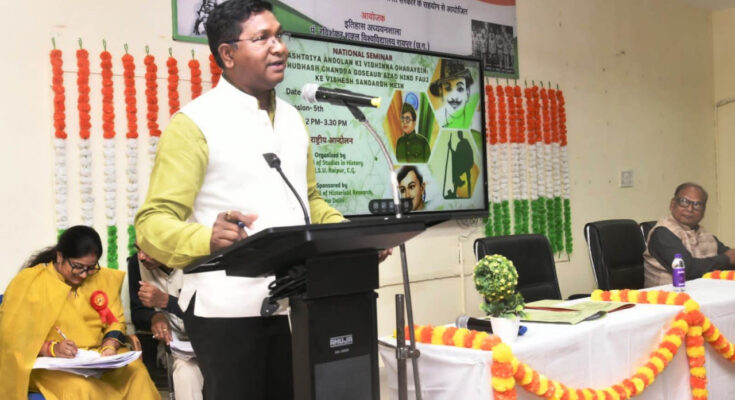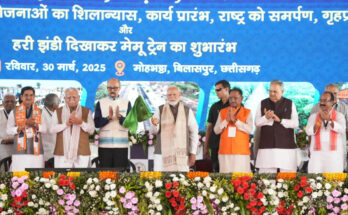Raipur, 18 March 2023

Pt. Ravi Shankar Shukla Vishwavidyalaya, Raipur is organizing a three-day National Seminar on “Different Currents of the National Movement – with special reference to Subhash Chandra Bose and Azad Hind Fauj”. President of the first academic session of the second day of the program Prof. K.K. Aggarwal discussed the impact of Subhash Chandra Bose’s ideas on Chhattisgarh and the way Bose’s followers were carried forward by the regional leaders of Chhattisgarh. Resource Person Mr. Dhananjay Rathore, Joint Director Public Relations, while discussing the establishment of Azad Hind Army, said that Subhash Chandra Bose was a supporter of equality between men and women, to give it a shape, a separate regiment of women was formed. In this session, a total of 08 research papers were read by the researchers.

The President of the second academic session, Prof.B.L. Bhadani highlighted the contribution of Subhash Chandra Bose in various streams of the national movement and stressed the need to do research on the lesser known freedom fighters. Resource Person Prof. PC Mahto, Government Labor Girls College, Palamu, Jharkhand spoke on the personality of Subhash Chandra Bose. Resource Person Prof. Anil Kumar Pandey Vishwanath Yadav, Tamaskar Post Graduate Science College, Durg discussed in detail the formation of Azad Hind Fauj and various aspects related to it. A total of 10 research papers were read in this session.
President of the third academic session Prof. LS. While discussing the contribution of Subhash Chandra Bose to the Indian independence movement, Nigam explained through an example that the way two railway tracks run parallel and merge together at the end, in the same way the ideology of the Indian independence movement and the ideology of Subhash Chandra are different. Different but the goal is the same. Resource Person Prof. S.I. Coretti, Head Department of History, Tukdoji Sant Maharaj Vishwavidyalaya, Nagpur while throwing light on the topic “India of Netaji’s dreams” told that Subhash Chandra Bose used to say that independent India should have a political philosophy. He talked about his political contribution to the mainstream of the national movement. Even today, the relevance of Subhash Chandra Bose’s thoughts is being kept alive by the tribal brothers wearing the costumes of Subhash Chandra Bose on the commemoration day of Kangla Manjhi for three consecutive days from December 5 every year in Baghmar village of Balod district of Chhattisgarh. A total of 7 research papers were read in this session.
President of the fourth academic session Prof. A.K. Patnaik, former Head of the Department, Utkal University Bhubaneswar, Orissa discussed the contribution of Subhash Chandra Bose to the Indian National Movement. The resource person of this session, Dr. Pankaj Singh, Assistant Professor, Dr. Harisingh Gour University, Sagar, Madhya Pradesh told that different streams of national movement were going on simultaneously. On the one hand, Jyotibarao Phule and Savitri Bai Phule were taking the importance of education in the field of social reform, and on the other hand, in Madhya Pradesh, peasant movement, labor movement, tribal movement were also running together for the independence of India. Subhash Chandra Bose ICS in England. Passed the examination but his inclination was towards Indian independence. Due to which he resigned and came to India and started participating in political activities. At this time two ideologies were running in Indian politics, A non-violent ideology and a violent ideology, but the aim of both the streams was only to get freedom. Apart from this, highlighted the untouched aspects related to the family of Subhash Chandra Bose. A total of 8 research papers were read in this session. Dr. Seema Pal conducted the seminar.




